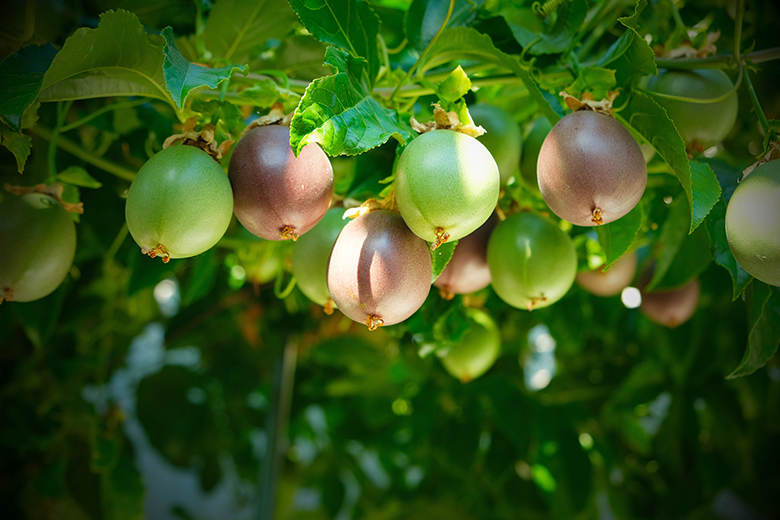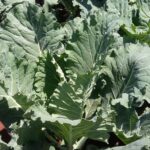Passion fruit, the fruit of several plants in the Passiflora genus, is a popular tropical fruit known for its sweet-tart flavour and vibrant colour. The fruit can be round or oval, with skin colours ranging from yellow and red to purple and green. Known for its versatility, passion fruit is used in juices, desserts, and various culinary dishes. Successful cultivation of passion fruit requires attention to environmental factors, effective disease and pest management, proper nutrition, and weed control. This article covers essential information on passion fruit farming, including its description, growth conditions, farming stages, diseases, pests, nutrition, and weed management.
Description
Passion fruit belongs to the Passiflora genus, and its fruit is highly aromatic, with a pulp full of edible seeds. It grows on a vine that requires support, as the plant is a climbing shrub. The fruit is rich in vitamin C, fiber, and antioxidants, making it a nutritious addition to any diet. The flavour is a combination of sweet and tangy, with a strong citrus note.
Ideal Conditions for Passion Fruit Growth
Successful passion fruit farming depends heavily on creating the right environment for growth.
Here are the essential factors to consider:
Soil
Passion fruit thrives in well-drained, fertile soil rich in organic matter with a pH of 6.0–7.5. Soil that is too sandy or dry can be amended with compost or mulch to improve fertility and water retention.
Temperature
The ideal temperature range for passion fruit cultivation is between 20–30°C. Although passion fruit can tolerate slightly cooler or warmer conditions, temperatures outside this range may affect growth and fruiting.
Rainfall
Passion fruit needs 900–2000 mm of rainfall annually, ideally spread out over the year. In regions with less rainfall, irrigation can supplement water needs.
Sunlight
Sunlight Passion fruit requires at least five hours of direct sunlight per day. Without sufficient sunlight, the plant may struggle to flower and fruit.
Humidity
Moderate humidity is beneficial for passion fruit. Extreme humidity or dryness can stress the plants.
Support
Passion fruit vines need a support structure like a fence, pergola, or wire netting to climb and spread.
STAGES OF PASSION FRUIT FARMING
Passion fruit farming progresses through several stages, each of which requires specific care to ensure healthy growth and optimal fruit production. These stages are:
Nursery/Transplanting (0–2 weeks)
This is the initial stage, where seeds or seedlings are planted in the nursery. Careful attention is needed to protect the young plants from diseases and pests.
Vegetative Stage (3–4 weeks)
During this stage, the plant develops leaves, stems, and roots. Adequate nutrition and water are critical to ensure healthy vegetative growth.
Flowering Stage (5–7 weeks)
Passion fruit plants begin to flower, and this stage is vital for fruit development. The right balance of nutrients, sunlight, and water is necessary to promote good flower production.
Fruiting Stage (8–11 weeks)
Once the flowers are pollinated, the fruit begins to develop. Proper care during this stage ensures that the fruit matures into a high-quality product.
Harvesting Stage (12–16 weeks)
The fruit is ready for harvest when it reaches its full size and ripeness. Harvesting should be done carefully to avoid damaging the fruit.
Diseases and Disease Control
Passion fruit is susceptible to a range of diseases at different growth stages. Below is a guide to common diseases and their control measures:
Leaf Spots (During Nursery/Transplanting to Flowering)
Control: Use either Orizole 250EC (Tebuconazole 250g/L) at 15ml/20L or Topguard 500SC (Thiophanate Methyl 500g/L).
Downy Mildew (Nursery/Transplanting)
Control: Preventative use of Tajiri 720WP (Mancozeb 640g/Kg + Cymoxanil 80g/Kg) at 40g/20L.
Powdery Mildew and Anthracnose (All Stages)
Control: Use Orizole 250EC (Tebuconazole 250g/L), Tabibu 500SC (Thiophanate Methyl 400g/L + Hexaconazole 100g/L), or Dewklin 250EC (Difenoconazole 250g/L) at 15ml/20L.
Scab (During Harvesting Stages)
Control: Use Dewklin 250EC at 15ml/20L.
Fusarium Wilt and Root Rot (Vegetative to Harvesting)
Control: Drench with Topguard 500SC at 40ml/20L.
Pests and Pest Control
Passion fruit is also affected by various pests, which can impact plant health and fruit production. Effective pest control measures include:
Root Mealy Bugs and Scales (During Nursery/Transplanting)
Control: Use Acatak Top 700WG (Acetamiprid 700g/Kg) at 2.5g/20L.
Mites, Thrips, and Leaf Miners (During Vegetative to Harvesting)
Control: Use Agrimec 18EC (Abamectin 18g/L), Cadence Gold, Spidor 240SC (Spirodiclofen 240g/L), or Emmaron 30SC (Emmamectin Benzoate 200g/L + Lufenuron 100g/L) at specified rates.
Aphids (During Nursery/Transplanting to Harvesting)
Control: Use Acatak Top 700WG at 2.5g/20L or other insecticides like Vendex 50EC or Alfatox 100EC.
Melon Fly and Fruit Flies (During Vegetative to Harvesting)
Control: Use Emmaron 30SC or May 50EC at 10ml/20L.
Nematodes (During Nursery/Transplanting and Vegetative Stages)
Control: Use Foscap Top 250ME (Fosthiazate 200g/L + Abamectin 50g/L) at 75ml/20L or Foscap 105GR (Fosthiazate 100g/Kg + Abamectin 5g/Kg) in planting holes.
Nutritional Foliar Fertilizers
Proper nutrition is essential for healthy growth and high fruit yield in passion fruit farming. Foliar fertilizers can enhance plant growth at different stages:
Nursery/Transplanting: Use Genie Gold 500SL (Ascophyllum Nodosum 500g/L) at 15ml/20L for stress management and root development.
Vegetative Stage: Use Brilliant (Ammonium Phosphate) at 40ml/20L for vegetative growth and Microfert TI at 20ml/20L to enhance photosynthesis.
Flowering to Harvesting: Use Cabozinc SC (Liquid Calcium 56%) at 30ml/20L to boost flower production and prevent flower abortion. Continue using Microfert TI for flower and fruit consistency.
Weed Control
Weed control is crucial for maintaining healthy passion fruit plants. Effective weed management practices include:
Pre-Planting: Use Kausha 480SL (Glyphosate 480g/L) during land preparation to eliminate weeds.
Ongoing Weed Management: Maintain short grasses for soil conservation and to prevent erosion.
Always use Golden Leaf at 2ml/20L as a Wetter, Spreader, and Sticker to enhance the effectiveness of other treatments.
Successful passion fruit farming requires careful attention to environmental conditions, disease and pest management, nutrition, and weed control. By understanding the stages of growth, managing diseases and pests, providing adequate nutrients, and applying effective weed control measures, farmers can maximize yields and produce high-quality passion fruits.




